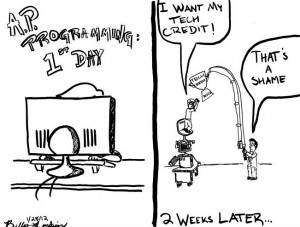Computers are integral to all sorts of systems across the modern world. The field of computer science is full of opportunity and career options. So why don’t some computer-based classes count toward technology education requirements in Maryland?

That would be a good question to ask the Maryland State Board of Education. In 2005, the Board changed the standards for what constitutes a tech credit, proclaiming that tech courses should teach every student “the ability to use, manage, understand, and assess technology.” Two years later, the Maryland Department of Education reduced the number of MCPS courses offering tech credits from about 100 to just three for the class of 2012 and beyond, determining that these three were the only tech courses fulfilling the Maryland requirements.
Though progressive technology education is definitely a cause worth supporting, the Board’s tech credit standards are too vague and unrealistic to be viable. Instead of trying to build on the flawed standards, the Board should eliminate them and introduce new standards that include specialized tech courses.
“Technology” is an enormously broad term that encompasses everything from coffee makers to quantum computers. The tech credit standards barely specify any actual course material, instead outlining ambiguous requirements and guidelines for tech credit courses, like teaching students to “demonstrate an understanding of the history of technology and its impact on society.” Classes like Computer Programming and Software Applications by Design don’t meet these standards because they’re focused on specific types of technology. Trying to teach students about such a huge topic as technology with such vague standards in a single high school class is like trying to chisel away a mountain in one day—impossible, especially with time constraints.
Current standards leave out interesting tech-related classes and stifle the creation of new ones by subjecting them to rigorous and unrealistic requirements. Creating a set of standards that includes narrowly focused tech classes would halt this trend and introduce students to stimulating subjects that the current tech credit courses leave out, like computer courses.
Two of the three classes offering tech credits, Principles of Engineering and Foundations of Technology, both attempt to uphold the all-encompassing tech credit standards. As many students testify, they fail and wind up as messy engineering sampler courses. Throwing material like this at students and hoping they’ll catch some of it isn’t an effective way to teach technology.
The other tech credit class, Introduction to Engineering Design, focuses almost exclusively on 3D design and modeling and doesn’t fulfill the standards. This isn’t a bad thing, however. Narrowly focused classes like IED expose students to a wider variety of meaningful subject material on a more functional level.
MCPS shouldn’t subject students to overcomplicated and excessively broad tech credit courses. It’s time for the Board to overhaul the tech credit standards and include specialized tech courses.
Liam Knox has completed both Computer Programming I and Principles of Engineering, and he really wishes he’d gotten a tech credit for the former.








